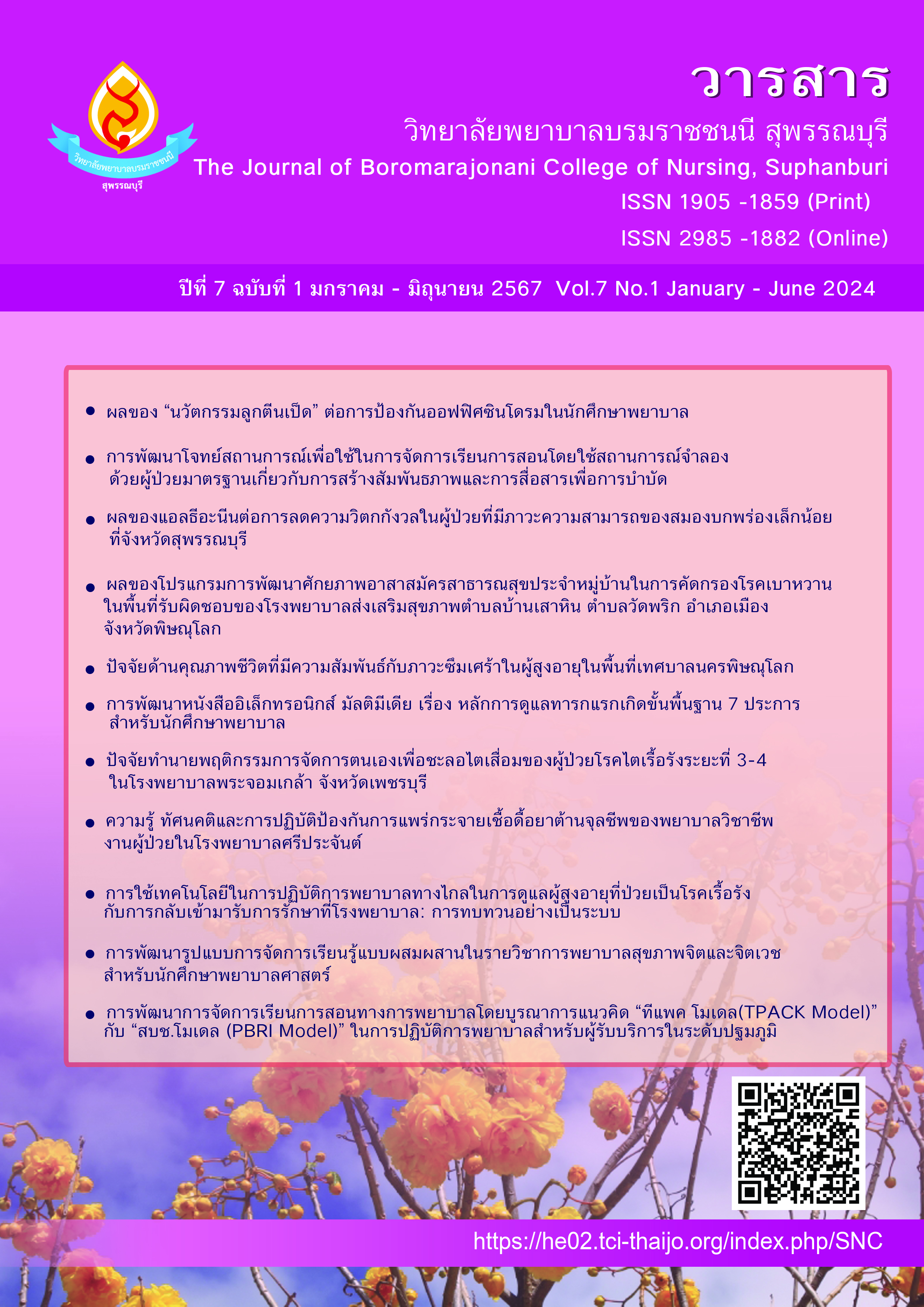ผลของแอลธีอะนีนต่อการลดความวิตกกังวล ในผู้ป่วยที่มีภาวะความสามารถของสมองบกพร่องเล็กน้อยที่จังหวัดสุพรรณบุรี
คำสำคัญ:
แอลธีอะนีน, ภาวะความสามารถของสมองบกพร่องเล็กน้อย, ความวิตกกังวลบทคัดย่อ
การวิจัยครั้งนี้เป็นการวิจัยเชิงทดลองแบบสุ่ม มีกลุ่มควบคุม และปกปิดข้อมูลสองทาง วัตถุประสงค์เพื่อ ศึกษาผลของแอลธีอะนีนในการลดความวิตกกังวล ความดันโลหิต และอัตราการเต้นของหัวใจในผู้ป่วยที่มีภาวะความสามารถของสมองบกพร่องเล็กน้อย กลุ่มตัวอย่างเป็นผู้ป่วยที่มีภาวะความสามารถของสมองบกพร่องเล็กน้อยและมีภาวะวิตกกังวล จำนวน 20 ราย แบ่งอาสาสมัครออกเป็นสองกลุ่มโดยการสุ่มตัวอย่าง คือ กลุ่มที่ได้รับแอลธีอะนีน 200 มิลลิกรัม และกลุ่มที่ได้รับยาหลอกกลุ่มละ 10 ราย โดยรับประทานเพียงครั้งเดียว จากนั้นทำการเก็บข้อมูลประเมินค่าความวิตกกังวลโดยใช้แบบวัดความวิตกกังวลขณะเผชิญ (Stress-Trait Anxiety Inventory) วัดความดันโลหิตและอัตราการเต้นของหัวใจ ก่อนและหลังทำการทดลอง 60 นาที วิเคราะห์ข้อมูลโดยการแจกแจงความถี่ ร้อยละ ค่าเฉลี่ย และส่วนเบี่ยงเบนมาตรฐาน และใช้สถิติ paired t-test วิเคราะห์ผลก่อนและหลังการทดลองภายในกลุ่มเดียวกัน ส่วนการวิเคราะห์ผลต่างก่อนและหลังการทดลองใช้สถิติ Mann-Whitney U test
ผลการศึกษาพบว่า ค่าเฉลี่ยคะแนนความวิตกกังวลขณะเผชิญภายหลังการทดลองของกลุ่มที่ได้รับแอลธีอะนีน มีค่าลดลงอย่างมีนัยสำคัญทางสถิติ (p=0.023) ค่าความดันโลหิตขณะหัวใจบีบตัวในกลุ่มที่ได้รับแอลธีอะนีนมีค่าลดลงอย่างมีนัยสำคัญทางสถิติ (p=0.021) เมื่อเปรียบเทียบความดันโลหิตขณะหัวใจคลายตัวและอัตราการเต้นของหัวใจพบว่าไม่มีความแตกต่างอย่างมีนัยสำคัญทางสถิติ จากงานวิจัยสามารถสรุปได้ว่าแอลธีอะนีนสามารถใช้เป็นทางเลือกหนึ่งในการลดระดับความวิตกกังวลในคนไข้ที่มีภาวะความสามารถของสมองบกพร่องเล็กน้อยได้
เอกสารอ้างอิง
สถาบันวิจัยประชากรและสังคม มหาวิทยาลัยมหิดล มูลนิธิสถาบันวิจัยและพัฒนาผู้สูงอายุไทย. (2564).
สถานการณ์ผู้สูงอายุไทย. บริษัท อมรินทร์พริ้นติ้ง แอนด์พับลิชชิ่ง จํากัด.
Adhikary, R., & Mandal, V. (2017). L-theanine: A potential multifaceted natural bioactive amide as health supplement. Asian Pacific Journal of Tropical Biomedicine, 7(9), 842-848.
Camfield, D. A., Stough, C., Farrimond, J., & Scholey, A. B. (2014). Acute effects of tea constituents L-theanine, caffeine, and epigallocatechin gallate on cognitive function and mood: a systematic review and meta-analysis. Nutrition reviews, 72(8), 507-522.
Cooper, R. (2012). Green tea and theanine: health benefits. International journal of food sciences and nutrition, 63(suppl1), 90-97.
Darragh, M., Yow, B., Kieser, A., Booth, R. J., Kydd, R. R., & Consedine, N. S. (2016). A take-home placebo treatment can reduce stress, anxiety and symptoms of depression in a non-patient population. The Australian and New Zealand journal of psychiatry, 50(9), 858–865.
Gauthier, S., Reisberg, B., Zaudig, M., Petersen, R. C., Ritchie, K., Broich, K., Belleville, S., Brodaty, H., Bennett, D., Chertkow, H., Cummings, J. L., de Leon, M., Feldman, H., Ganguli, M., Hampel, H., Scheltens, P., Tierney, M. C., Whitehouse, P., & Winblad, B. (2006). Mild cognitive impairment. The lancet, 367(9518), 1262-1270.
Gulpers, B., Ramakers, I., Hamel, R., Köhler, S., Voshaar, R. O., & Verhey, F. (2016). Anxiety as a predictor for cognitive decline and dementia: a systematic review and meta-analysis. The American Journal of Geriatric Psychiatry, 24(10), 823-842.
Hidese, S., Ota, M., Wakabayashi, C., Noda, T., Ozawa, H., Okubo, T., & Kunugi, H. (2017). Effects of chronic l-theanine administration in patients with major depressive disorder: an open-label study. Acta neuropsychiatrica, 29(2), 72-79.
Hidese, S., Ogawa, S., Ota, M., Ishida, I., Yasukawa, Z., Ozeki, M., & Kunugi, H. (2019). Effects of L-theanine administration on stress-related symptoms and cognitive functions in healthy adults: a randomized controlled trial. Nutrients, 11(10), 2362.
Kakuda, T. (2011). Neuroprotective effects of theanine and its preventive effects on cognitive
dysfunction. Pharmacological research, 64(2), 162-168.
Kardashev, A., Ratner, Y., & Ritsner, M. S. (2018). Add-on pregnenolone with L-theanine to antipsychotic therapy relieves negative and anxiety symptoms of schizophrenia: an 8-week, randomized, double-blind, placebo-controlled trial. Clinical schizophrenia & related psychoses, 12(1), 31-41.
Martin, E., & Velayudhan, L. (2020). Neuropsychiatric symptoms in mild cognitive impairment: a literature review. Dementia and geriatric cognitive disorders, 49(2), 146-155.
Murman D. L. (2015). The Impact of Age on Cognition. Seminars in hearing, 36(3), 111–121.
Petersen, R. C. (2004). Mild cognitive impairment as a diagnostic entity. Journal of internal
medicine, 256(3), 183-194.
Regan, B., & Varanelli, L. (2013). Adjustment, depression, and anxiety in mild cognitive impairment and early dementia: a systematic review of psychological intervention studies. International psychogeriatrics, 25(12), 1963-1984.
Sakamoto, F. L., Ribeiro, R. M. P., Bueno, A. A., & Santos, H. O. (2019). Psychotropic effects of L-theanine and its clinical properties: From the management of anxiety and stress to a potential use in schizophrenia. Pharmacological research, 147, 104395.
Sarris, J., Byrne, G. J., Cribb, L., Oliver, G., Murphy, J., Macdonald, P., Nazareth, S., Karamacoska, D., Galea, S., Short, A., Ee, C., Birling, Y., Menon, R., & Ng, C. H. (2019). L-theanine in the adjunctive treatment of generalized anxiety disorder: A double-blind, randomised, placebo-controlled trial. Journal of psychiatric research, 110, 31-37.
Shen, M., Yang, Y., Wu, Y., Zhang, B., Wu, H., Wang, L., Tang, H., & Chen, J. (2019). L‐theanine ameliorate depressive‐like behavior in a chronic unpredictable mild stress rat model via modulating the monoamine levels in limbic–cortical–striatal–pallidal–thalamic‐circuit related brain regions. Phytotherapy Research, 33(2), 412-421.
Suphamongkhon, N. (2004). Anxiety, social support, and coping strategies of university students (Unpublished Thesis Master of Arts). Chulalongkorn University.
Türközü, D., & Şanlier, N. (2017). L-theanine, unique amino acid of tea, and its metabolism, health effects, and safety. Critical reviews in food science and nutrition, 57(8), 1681-1687.
United Nations Department of Economic and Social Affairs, Population Division (2022). World Population Prospects 2022: Summary of Results.
Weber, J., Angerer, P., & Apolinário-Hagen, J. (2022). Physiological reactions to acute stressors and subjective stress during daily life: a systematic review on ecological momentary assessment (EMA) studies. PloS one, 17(7), e0271996.
White, D. J., De Klerk, S., Woods, W., Gondalia, S., Noonan, C., & Scholey, A. B. (2016). Anti-stress, behavioural and magnetoencephalography effects of an L-theanine-based nutrient drink: a randomised, double-blind, placebo-controlled, crossover trial. Nutrients, 8(1), 53.
Williams, J. L., Everett, J. M., D'Cunha, N. M., Sergi, D., Georgousopoulou, E. N., Keegan, R. J., McKune, A. J., Mellor, D. D., Anstice, N., & Naumovski, N. (2020). The effects of green tea amino acid L-theanine consumption on the ability to manage stress and anxiety levels: A systematic review. Plant foods for human nutrition, 75, 12-23.
Yoto, A., Motoki, M., Murao, S., & Yokogoshi, H. (2012). Effects of L-theanine or caffeine intake on changes in blood pressure under physical and psychological stresses. Journal of physiological anthropology, 31(1), 1-9.
ดาวน์โหลด
เผยแพร่แล้ว
ฉบับ
ประเภทบทความ
สัญญาอนุญาต
ลิขสิทธิ์ (c) 2024 วิทยาลัยพยาบาลบรมราชชนนี สุพรรณบุรี

อนุญาตภายใต้เงื่อนไข Creative Commons Attribution-NonCommercial-NoDerivatives 4.0 International License.
บทความที่ได้รับการตีพิมพ์เป็นลิขสิทธิ์ของวารสารวิทยาลัยพยาบาลบรมราชชนนี สุพรรณบุรี
ข้อความที่ปรากฏในบทความแต่ละเรื่องในวารสารวิชาการเล่มนี้เป็นความคิดเห็นส่วนตัวของผู้เขียนแต่ละท่านไม่เกี่ยวข้องกับวิทยาลัยพยาบาลบรมราชชนนี สุพรรณบุรี และคณาจารย์ท่านอื่นๆในวิทยาลัยฯ แต่อย่างใด ความรับผิดชอบองค์ประกอบทั้งหมดของบทความแต่ละเรื่องเป็นของผู้เขียนแต่ละท่าน หากมีความผิดพลาดใดๆ ผู้เขียนแต่ละท่านจะรับผิดชอบบทความของตนเองแต่ผู้เดียว



